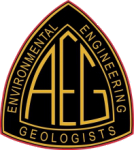
|
AEG has numerous Chapters throughout the United States & internationally, offering regional opportunities to learn & network in a casual yet professional atmosphere.
©2018 Association of Environmental & Engineering Geologists
aeg.nyp@gmail.com
Membership Software :: Legal

.gif)